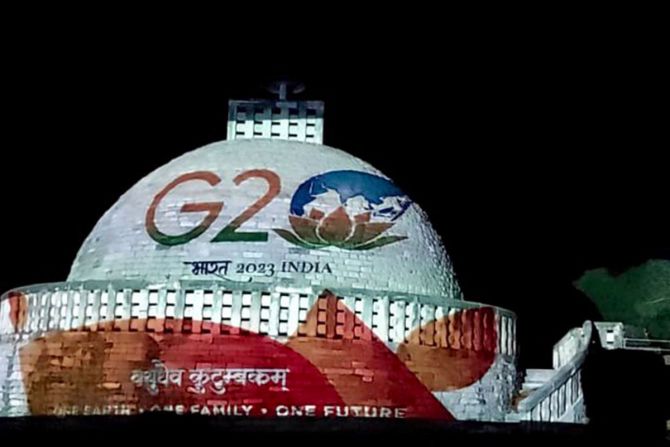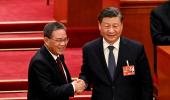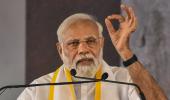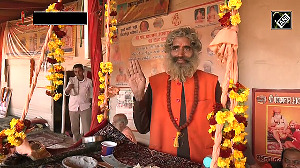'The group commands 85 per cent of the global GDP, and if you are able to convey your point of view effectively to this group then you have reached more or less all the important players that matter.'

In July 1963, with the Cold War at its peak, United States President John F Kennedy felt it was far better that the leaders of the US and Soviet Union met at a summit -- a term Winston Churchill coined in 1950 -- than on the brink of a nuclear war.
In the post-Cold War era, summitry of top world leaders, especially of the multilateral kind, is far more frequent and takes place in contexts that may seem less urgent but are politically equally nuanced.
Hosting global conferences or international sporting events, such as the Olympics, could be an effort by an emerging economy to announce it's coming of age and win international prestige.
It could also help a country's incumbent leadership to renew its domestic political legitimacy.
'We notice that whenever a country hosts an Olympics or a major summit, its profile changes significantly on the world stage,' Prime Minister Narendra D Modi said when he inaugurated the Bharat Mandapam, the new 7,000-seater conference hall-cum-exhibition centre in the heart of New Delhi and the venue for the G20 summit.
Modi juxtaposed the hosting of G20, India's economic growth and his government's third term.
It is 'Modi's guarantee', he said, that in his third term, 'India will be among the top three economies in the world'.
The world will witness 'the rising strides of India and its growing stature' when the 'grand' Bharat Mandapam hosts the G20 summit, he added.
The decades after the end of the Second World War saw emerging economies, such as Japan, Mexico and West Germany, signal their rise by hosting the Olympics in 1964, 1968 and 1972, respectively.
Cancun in Mexico hosted the 1981 North-South Summit on Cooperation and Development and key multilateral gatherings in the subsequent years.
In the 1980s, 35 years after the Korean War devastated the region, South Korea showcased its rapid economic growth, the 'Miracle on the Han River', by hosting the Asian Games in 1986 and the Olympics in 1988.
The Mexico Olympics survives in public memory for its authoritarian regime crushing the students' movement days before the game. The students questioned the lavish spending.
Athens Olympics in 2004, with its decaying venues, foretold Greece's 2007-2008 debt crisis and the 1936 Berlin Olympics was Adolf Hitler's desire to win international legitimacy.
The Beijing Olympics 2008, awarded to China in 2001, the year Goldman Sachs economist Jim O'Neill first coined BRIC (an acronym for Brazil, Russia, India and China) to describe fast-growing economies that would come to dominate the global economy by 2050, signalled to the world the Chinese economic miracle.
In the 2010s, the BRICS member countries were the toast of the world. South Africa hosted the Fifa World Cup in 2010, Brazil in 2014 and Russia in 2018.
Brazil was the 2016 Rio Olympics venue, and Russia hosted the 2014 Sochi Winter Olympics.
The Rio+20 Summit took place in Rio de Janeiro in 2012, and China's Hangzhou hosted the 2016 G20 Summit.
In the initial years of the United Progressive Alliance II government, India's global profile started to change.
US President Obama invited then prime minister Dr Manmohan Singh as his guest for the first State dinner of his presidency in November 2009.
In 2010, India hosted the heads of State/government of the P5, or the permanent five members of the UN Security Council, in a single year.
Although New Delhi also hosted the BRICS Summit and India-ASEAN Summit in 2012 with pomp, things went downhill for that government from 2011 onwards.
The 2010s weren't the first in terms of India hosting international events.
After returning to power in 1980, then prime minister Indira Gandhi started afresh to craft her global stature and India's international image.
In 1982, India hosted the Asian Games. In March 1983, New Delhi hosted the Non-Aligned Movement summit and in November of that year, the Commonwealth Heads of Government Meeting.
While threats by non-State actors have receded in recent years, those of disruption of a world event by non-participants, such as activists and non-governmental organisations like Greenpeace, Amnesty and Human Rights Watch, are more persistent.
In his speech, Modi lashed out at pessimistic minds in India for obstructing Bharat Mandapam's construction.
'They caused a lot of turmoil and were involved in a series of legal battles,' he said.
Activists have protested the government evicting thousands of slum-dwellers from the venue area, leaving them homeless.
In the run-up to the G20 summit, the government and the Bharatiya Janata Party need to ensure peace in Manipur and show an inclusive face.
Former Ambassador Yogesh Gupta believes the G20 presidency and hosting leaders representing the top global economies is a huge opportunity for India to showcase its strengths in digital technology and to put forth its perspectives on key issues such as energy and food security.
"The group commands 85 per cent of the global GDP, and if you are able to convey your point of view effectively to this group then you have reached more or less all the important players that matter," Gupta said.
Modi, he said, has taken the lead on flagging the concerns of the Global South, adding to India's rising stature in these countries as well.
Feature Presentation: Aslam Hunani/Rediff.com












 © 2025
© 2025